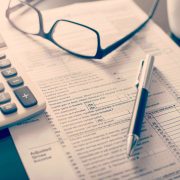Four Tax Deductions for Traders
Working as a day trader can be a challenge. Making quick moves in a constantly fluctuating stock market that result in consistent profit is a job that takes time, skill, and resources to master.
Fortunately, when tax season rolls around, many of the expenses required to keep up with the industry translate into write-offs. In fact, any costs defined as ordinary and necessary to collecting and managing your income can be deducted. If you keep a detailed list of your business expenditures throughout the year, your tax preparation expert will be able to help you determine what qualifies as a deduction.
Key expenses to keep in mind as a day trader when it comes time to file your taxes:
1) Office Expenses
Home Office
A lot of the appeal of becoming a full-time day trader is the option to work from home. If you are self-employed and use a home office as the base of your trading business, it can be claimed as a deduction on your Schedule C. This value is usually a portion of your mortgage, rent, and/or utilities determined by the relative square footage of your workspace.
Outside Office
If you choose to day trade from an office outside of your home, you may claim your rent, utilities, and other related costs. You may even be able to deduct travel and vehicle expenses as well.
Equipment & Supplies
The materials necessary to keep your office functioning can be claimed as tax deductions up to a certain value. This includes but is not limited to:
- Furniture (desk, chairs, cabinets, etc.)
- Computers & software
- Phone and Internet services
- Standard office supplies (paper, pens, folder, etc.)
2) Depreciation Expenses
It’s a fact of life that the more you use something and the older it gets, the less valuable it becomes. As an active trader, you’re able to write off this depreciation on your taxes. Equipment, furniture, software, and other business supplies above the tangible property threshold qualify.
Both new and used property is eligible to be claimed. Keep in mind though that you can only claim depreciation value if your income offsets the deduction.
3) Trading Resource Expenses
Education
To be successful as a trader, you need to keep up with the latest information and strategy in the industry. Constantly updating your knowledgebase and refining your skills is essential in a profession that is always growing and changing. Fortunately, continuing education costs—including seminars, classes, books and guides—can be deducted from your income at tax time.
 Professional Counsel
Professional Counsel
Have you consulted with an expert for investment advice and to help you improve your strategy? If so, the fees can be listed as a tax deduction. This applies to professional and research services as well, including automated trading systems for which you have written code or helped create/modify in some other way.
Other Business Fees
More often than not, you’re going to need some help from other consulting professionals to establish and optimize your trading business. The good news is, service fees related to your investment/trading income can be claimed as tax deductions. This may include legal, bookkeeping, accounting, and other business operating expenditures.
4) Interest Expenses
Although you likely won’t be borrowing significant amounts of money, there are occasions where you may end up taking out small loans to purchase trader’s positions. Any interest you pay on these loans can be deducted in full come tax season. This is referred to as “margin interest”. Paid credit card interest related to your trading endeavors may qualify as well.
To truly maximize your trading dollars year after year, the most effective solution is to enlist a professional service to implement a tax deduction strategy. Trader’s Accounting is the leading provider of tax preparation and consultation services for active traders, dedicated to expertly handling your taxes so you don’t have to.
Contact our team today to learn more about how we can help your trading business and to schedule your free consultation!














Leave a Reply
Want to join the discussion?Feel free to contribute!